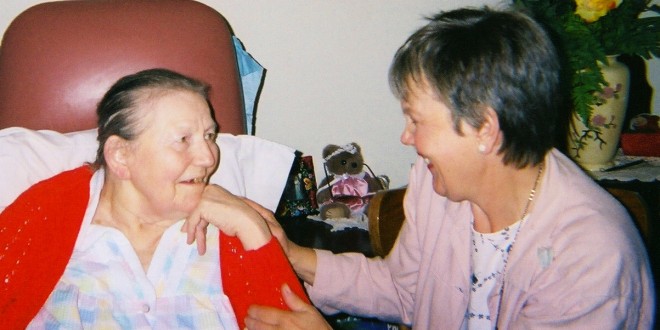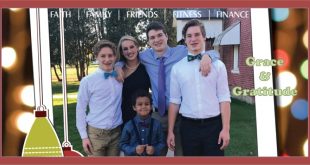Maintaining Hopeful Holidays for Dementia Patients and Their Caregivers
The holidays are poignant because of our gatherings. Families gather and, in turn, memories are gathered. Stories are told—stories of when we were younger, braver or more cautious, impetuous or reserved. Such stories stir our emotions and tickle our funny bones; but for some families, there are beloved brothers and mothers, sisters and spouses unstirred by such stories, due to Alzheimer’s and related dementias. What are holiday gatherings like in such families? How do caregivers cope? Perhaps, most importantly, how can we best care for those afflicted and their caregivers?
Lisa Wells, MA, CDP, is a dementia care specialist at the Aging & Disability Resource Center of Eau Claire County. For 26 years (12 at the Resource Center), she has cared for loved ones with the disease, supported family caregivers, and fostered dementia-friendly communities.
Caring for your self is a prerequisite for caring for others. Wells explains via an analogy.
On the airplane, the flight attendant explains how to use the oxygen mask. She expresses the importance of putting the mask on yourself first and then on your children or the person next to you if they are having trouble. Without taking the oxygen first, how can we care for our loved ones?
However, self-care can become even more problematic during the holidays.
Holidays can certainly be stressful for families living with Alzheimer’s disease and other dementias. The holidays can mean schedule changes, festivities, visits from extended families, and more. When making holiday plans, it is important to adjust expectations, be selective in invitations you may accept, and include the person with dementia in a task or job they can do. Also when making plans, depending on the stage in the person’s disease, you may need to explain to family and friends prior to the event that “Mom has dementia. Sometimes she eats with her fingers.” Doing so may help alleviate some anxiety. Most importantly, ask for help!
Surprisingly, the holidays can also help.
I worked in skilled nursing facilities on Alzheimer’s units for 14 years and the holidays were my favorite time of year with the residents. The power of music is amazing! Some residents may have lost much of their ability to speak or carry on a conversation, but when the activity director would sit down at the piano and play Christmas carols, the residents could sing every word. This ability to speak and have conversation would continue after the music would stop for a short time. Hot chocolate and reminiscing about traditions would spark some great conversation. It is important for caregivers to remember that people with dementia may lose many things, but their emotional memories remain until end of life.
For Kathy Jasper, who does medical diagnosis coding at St. Joseph’s Hospital Home Health and Hospice, it was the holidays that suggested the onset of Alzheimer’s in Mary, her sister.
We would be talking about the holidays, and Mary would get upset asking why we didn’t tell her about our holiday plans, even though we had. It started as little things like that. Since our dad had Alzheimer’s and died after aspirating, we used to kid each other when we would forget something that we would be next. We sure didn’t think it would be Mary, as she was a speech therapist with a master’s degree, always reading and doing crossword puzzles. Then she started losing clients at work; so her hours were cut eventually, and she was let go because of memory issues.
Mary is still part of the holidays.
We have a big family Thanksgiving, usually around 100 people. I will pick Mary up that morning and take her to Mom’s and we will peel 50 pounds of potatoes. She might only peel one, but that’s okay.
And how can we care for the caregiver?
Don’t expect caregivers to prepare the meal and have everyone over. Don’t ask them to take the loved one out, as familiar surroundings make it more relaxed.
For Jasper, the holidays are bittersweet.
Holidays bring memories for us with no regrets or hope, but when you get that smile or an out of the blue memory, it’s all worth it.
Another area pair contending with Alzheimer’s are Carla and Jack [pseud.]. Carla was a teacher and administrator who retired to care for her husband at  home. Not only did caretaking become her primary task, but so did all the jobs her husband used to do, such as caring for the car. Uncertainty is the only certainty.
home. Not only did caretaking become her primary task, but so did all the jobs her husband used to do, such as caring for the car. Uncertainty is the only certainty.
Jack still knows our family, still expresses his love, is still mobile, still dresses, feeds, and cares for his personal needs; but if the disease progresses according to a typical pattern, then these skills will also be eventually lost. We don’t know how long he will keep these skills … the disease progresses at very different rates in different people. We may see 20 more holidays together or this could be our last. A friend of mine—whose husband was at the same stage that Jack is now seven months ago—buried her husband last week.
The treasured rhythms and traditions of holidays can highlight how much has been lost.
The hardest part of the holidays or any day is that I have lost my partner, my lover, and my confidant. The person I knew is gone. I am living with a guy who I still love, but whose developmental level and reasoning skills are those of a five or six year old. There are moments when I see and enjoy glimmers of who Jack was, but they are short-lived. The hardest holiday was two years ago when Jack, who had always cooked the turkey and taken charge of the meal, was not able to cook. In fact, the day became so overwhelming for him that he spent much of it in bed instead of with the family. The hardest part of the holidays is realizing that Jack no longer initiates the traditions or the activities. At his best, he can participate minimally.
Carla still manages to extract some light from loss.
Joy comes from our faith in Jesus. We know that Heaven is our final destination and that there is a brighter day ahead. Daily joys come from celebrating the moments. If there is a bright side of Alzheimer’s, it is that it forces one to distill what is really important and teaches one to truly celebrate and cherish the moments. I no longer take for granted the times he says, “I love you,” and each time I wonder if this will be the last time that I hear those words from him. I am thrilled that he still knows me and our children, grandchildren, and close friends.
And holiday traditions can work like roots for memory-impaired people.
Jack still holds onto long-time memories. In fact, the past is actually more clear and real to him than the present or recent memories. He is beginning to struggle with details of the past, but I know his “stories” and help him fill in the details. The ”up” side of the holidays is that they are rooted in tradition, and familiarity is the friend of someone who is struggling with Alzheimer’s. Priorities change from career, possessions, and activities to simply spending time with people we care about. Each smile becomes something that is celebrated and cherished. We are prioritizing our time to reconnect with long held friends and family.
If you are friends or family of someone with Alzheimer’s, how can you give the best gift, that of supporting a caregiver and becoming a caregiver?
Continue to include and invite us to holiday gatherings, but understand if we cannot come or need to leave early. Our activities now need to be adjusted to the kind of day that Jack is having. When we invite you, offer to bring something. Offer to take Jack out for coffee or a drive so I can have some personal time and so Jack can have some time apart from me. Ask if there is something specific that we need or a task that we need help with. I am so grateful for the guy who asked if our lawnmower needed an oil change before winter.
In short, simply connect.
I have learned that the important things in life are not things. The important things are relationships … with God, with family, and with friends.
 Chippewa Valley 5ive for Women The Chippewa Valley’s Premier Magazine for Women!
Chippewa Valley 5ive for Women The Chippewa Valley’s Premier Magazine for Women!











